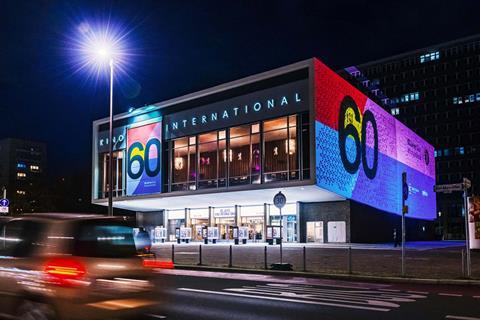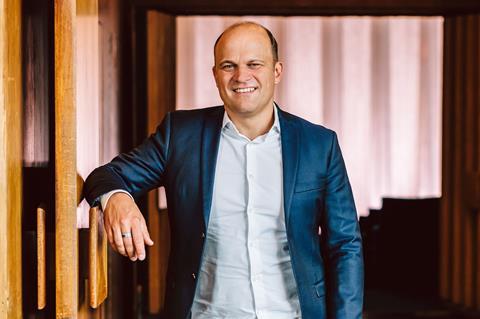German cinemas have had a tough start to 2024, but the arthouse sector is bucking the trend. Screen talks to Christian Bräuer at Berlin’s flourishing Yorck Cinema Group.

“We have had an excellent start to the year and it shows that cinema is clearly back,” says Christian Bräuer, co-managing director of Berlin’s Yorck Cinema Group, which operates 14 arthouse cinemas in the capital including Cinema Paris, Delphi Filmpalast and Kino International.
This seems to have been a different story for mainstream cinemas, which — despite strong outcomes for romantic comedy Anyone But You and local comedy hit Eine Million Minuten — lacked major blockbusters before the arrival of Dune: Part Two on February 29. This was reflected in overall box-office takings at German cinemas for the first 10 weeks of 2024, which were €152m ($165m), down from €184m ($199m) for the same period in 2023 — a decline of 17%.
Arthouse cinemas, on the other hand, have been able to count on such releases as Wim Wenders’ Oscar-nominated Perfect Days and Justine Triet’s Palme d’Or winner Anatomy Of A Fall, which have had staying power. Triet’s legal thriller was still showing in 223 sites after 19 weeks of release and had taken more than €4.8m ($5.2m) at the German box office by March 17, while Wenders’ most successful feature film for years entered its 12th week of release on 90 sites and takings of more than €4m ($4.3m).

“We sold 100,000 tickets for Anatomy Of A Fall in the Yorck Group cinemas alone,” notes Bräuer. The Plaion Pictures release had racked up 436,000 admissions nationwide by March 3.
And after opening in second place at the box office with a debut of almost €1m ($1.08m), Jonathan Glazer’s The Zone Of Interest had achieved 550,000 admissions and almost €4m ($4.3m) box office by its fourth week of release — the most successful A24 title in Germany to date.
Indeed, arthouse cinema has made a better recovery post-pandemic than the exhibition sector as a whole in Germany. According to figures collated by the German Federal Film Board (FFA), total admissions increased year-on-year by 22.7% between 2022 and 2023, but the AG Kino-Gilde association of arthouse cinemas reported a 30% increase in the number of tickets sold.
Admissions to the arthouse cinemas were only 17% below the level for 2019 before the pandemic. This compares to a shortfall of 19.4% for the overall market in 2023 compared to 2019, according to FFA.
“After the lockdowns it was a bit bumpy,” says Bräuer. “The older audience was hesitant and there were some people who didn’t come back. But one trend we have seen is that our audiences have become younger, there are more of them coming now and there are young people who were not with us before the pandemic.
“The pandemic accelerated some market trends,” he continues. “For example, there has been a tendency for people to take out subscriptions more quickly and the older generation suddenly became digitally literate when they were stuck at home. At the Yorck Group, we had already started very early on with developing activities in branding, using social media and audience development.”
Launched in 2009, the Yorck Unlimited subscription — with a minimum contract period of 12 months — allows subscribers to see as many films as they like in Yorck’s 14 cinemas as well as at the partner City Kinos in Munich. A subscription costs €19.90 ($21.60) per month and also brings discounts on snacks and drinks as well as on cinema tickets for up to five companions.
“The pandemic and funding from the Zukunftsprogramm Kino programme [a government scheme launched in 2020 to support cinemas during the pandemic] also gave us an opportunity to look at the customer experience and see how our customers get their cinema tickets and how we could speed up the process,” adds Bräuer. This led to Yorck’s loyalty card system switching to a digital-only system last year.
Curated programming

Another digital initiative saw the chain launch its Yorck On Demand platform in 2021 during the pandemic. Described as being “like a well-arranged videotheque in the streaming jungle”, the curated film programme is presented under different headings that include German Cinema, American Indies, MonGay, In the Mood — East Asian Cinema, Creepy Crypt and Female Filmmakers.
“We always had this in mind after having sold DVDs and Blu-rays in the cinemas, and then we had the time during the lockdowns to put it into practice,” explains Bräuer. “But our focus is still very much on showing films in the cinema.”
Titles in 2024 that are likely to chime with Yorck audiences include German-language Berlinale premieres such as Matthias Glasner’s Dying (which was awarded the festival’s AG Kino-Gilde prize) and Andreas Dresen’s From Hilde, With Love. Also coming this year are RP Kahl’s adaptation of Peter Weiss’s play The Investigation, about the Frankfurt Holocaust trials (in July), and Tom Tykwer’s The Light, his first feature in eight years (December).
Looking to the future of the arthouse sector, Bräuer, who has been chairman of the AG Kino-Gilde exhibitors association for the past 15 years and president of the International Confederation of Arthouse Cinemas (CICAE) since 2019, suggests that branding and audience development are two key areas to focus on. “We need to create more events around films and to have and renew a close connection with the audience,” he says.
With plans for major reforms to Germany’s national funding system currently underway and due to come into effect from January 1 next year, Bräuer believes that greater attention should be given to the exhibition and distribution sectors in the proposed legislation.
“It is not enough to support production alone, even though that may be good when Germany is wanting to get on an equal competitive footing with other production hubs,” he argues. “We need support for the arthouse cinemas for them to be able to maintain their individual character and quality and their strong connection with the local community. That’s what an independent cinema is all about and where our particular niche is.”







![The Brightest SunScreen[Courtesy HKIFF]](https://d1nslcd7m2225b.cloudfront.net/Pictures/274x183/3/5/0/1448350_thebrightestsunscreencourtesyhkiff_312678.jpg)

















No comments yet